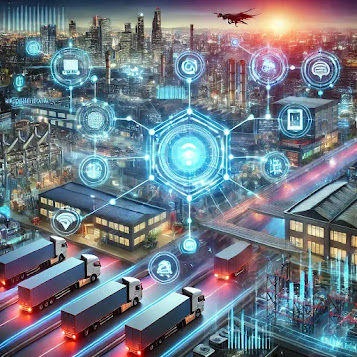Global Supply Chain Updates: Trends, Challenges, and Innovations
Hindustan Unilever (HUL) Streamlines Distribution
Hindustan Unilever is enhancing its distribution network by supplying products directly to kirana stores in Mumbai, aiming to reduce delivery times to under 24 hours. Traditionally, products passed through multiple intermediaries before reaching stores, leading to delays and higher costs. Under this new system, distributors will focus on managing orders and payments, while HUL takes direct control of logistics. This model ensures faster product availability, reduces inventory shortages, and helps small retailers maintain steady supplies. The company plans to extend this initiative to Delhi and other metropolitan areas in the coming months.
Source: Retail Economic Times
DHL Express Announces Price Increase
DHL Express has announced a 6.9% price hike on its parcel delivery services in India, effective from January 1, 2025. The company cites inflation, currency fluctuations, and increased regulatory compliance costs as key reasons for the increase. Global disruptions such as rising fuel prices and supply chain constraints have also impacted operational costs. DHL states that the new rates will ensure reliable, high-quality services and improved infrastructure investments. Many logistics firms are adjusting pricing structures to cope with global supply chain volatility.
Source: Infra Economic Times
AutoZone Faces Profit Challenges Due to Supply Chain Disruptions
AutoZone, one of the largest U.S. auto parts retailers, reported weaker-than-expected profits for the fourth quarter, citing rising inflation and ongoing supply chain disruptions. Despite a growing demand for DIY automotive parts, the company has faced higher procurement costs and shipment delays, leading to lower-than-expected revenue. Industry analysts remain optimistic, predicting that the aging U.S. vehicle fleet will continue to drive strong demand for replacement parts, creating long-term opportunities for AutoZone and its competitors.
Source: Auto Economic Times
Foxconn to Build Nvidia Superchip Factory
Foxconn has announced plans to build the world’s largest Nvidia GB200 chip manufacturing facility. The project aims to address the increasing global demand for AI and high-performance computing chips. As industries such as autonomous driving, robotics, and cloud computing expand, Nvidia’s advanced chips are in high demand. The facility will strengthen supply chain resilience in the semiconductor industry, which has faced severe shortages in recent years. The location and expected timeline for the plant’s completion are yet to be disclosed.
Source: Moneycontrol
India’s Position in Global Supply Chains Strengthens
A recent report by the State Bank of India (SBI) highlights India's growing role in global supply chains, particularly in pharmaceuticals, textiles, and electronics. As multinational corporations shift manufacturing away from China to diversify their supply chains, India is emerging as a key alternative. Government initiatives such as the Production-Linked Incentive (PLI) scheme and infrastructure upgrades have contributed to this trend. Experts believe that India’s ability to offer competitive labor costs and a large domestic market further strengthens its position.
Source: Moneycontrol
Weather Impacts on Agricultural Supply Chains in India
Severe rainfall in Himachal Pradesh has disrupted tomato supplies, causing sharp price spikes in North Indian markets. Farmers report significant crop losses due to excessive moisture, while landslides have damaged key transport routes, delaying shipments to major markets like Delhi’s Azadpur Mandi. Similar supply chain disruptions have affected other perishable goods, highlighting the vulnerability of agricultural logistics to extreme weather conditions. The government is exploring ways to improve cold storage infrastructure and alternative transport solutions to mitigate such disruptions in the future.
Source: Retail Economic Times
Technological Advancements in Supply Chain Management
Companies such as Tata CLiQ and Dealshare are leveraging advanced analytics—such as diagnostic, predictive, and prescriptive models—to enhance supply chain efficiency. These technologies help businesses predict demand fluctuations, optimize warehouse management, and reduce operational costs. AI-powered forecasting tools are also being adopted by major e-commerce platforms to prevent stockouts and improve delivery timelines. The growing use of automation, IoT sensors, and blockchain in supply chains is expected to drive significant improvements in efficiency and transparency.
Source: Retail Economic Times



Comments
Post a Comment